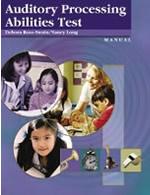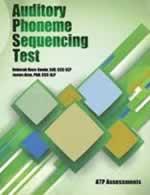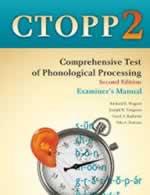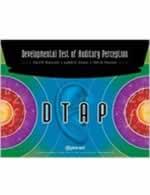CTOPP-2: Comprehensive Test of Phonological Processing-Second Edition
Interest Level:
Additional Components:
Test, Manual, Subtests, Record Booklets and Picture Book
This product requires a check of customer qualifications.
CLICK HERE to download qualifications form.
Testing Time: 40 minutes Administration: Individual The Comprehensive Test of Phonological Processing (CTOPP) was published in 1999 to meet the need for an assessment of reading-related phonological processing skills. Since its initial publication, the CTOPP has been popular with professionals in psychology and education. It has been used in many studies of reading and phonological processing in both typical and clinical populations. The extent of its widespread adoption and...
Testing Time: 40 minutes
Administration: Individual
The Comprehensive Test of Phonological Processing (CTOPP) was published in 1999 to meet the need for an assessment of reading-related phonological processing skills. Since its initial publication, the CTOPP has been popular with professionals in psychology and education. It has been used in many studies of reading and phonological processing in both typical and clinical populations. The extent of its widespread adoption and usage is evident from the results of a recent search of the PsychInfo database for research studies using the terms Comprehensive Test of Phonological Processing or CTOPP. The query returned 4,287 results.
Characteristics of the CTOPP-2
All new normative data were collected in 2008 and 2009. The test was normed on 1,900 individuals ranging in age from 6 through 24 years. The demographic characteristics of the sample conform to those of the population reported in the Statistical Abstract of the United States, and are, therefore, representative of the U.S. population.
The floor effects present in the 5- and 6-year-old version of the first edition have been eliminated by the addition of easier items and the ceilings were extended by the addition of more difficult items. The results of the item additions were so successful that it now is appropriate to administer the CTOPP-2 to 4-year-olds. The lower version of the CTOPP-2 now covers the 4- to 6-year-old range. A new phonological awareness subtest called Phoneme Isolation was added.
The model of phonological processing abilities was clarified. Confirmatory factor analyses were carried out and justified the presence of rapid naming subtests on a test of phonological processing. The model for 4- to 6-year-old range was revised by adding rapid naming of digits and letters to this version, and reporting scores on both symbolic and non-symbolic rapid naming at this level.
Uses of the CTOPP-2
The CTOPP-2 has four principal uses: (1) to identify individuals who are significantly below their peers in important phonological abilities, (2) to determine strengths and weaknesses among developed phonological processes, (3) to document individuals' progress in phonological processing as a consequence of special intervention programs, and (4) to serve as a measurement device in research studies investigating phonological processing.
CTOPP-2 Subtests
CLICK HERE to download qualifications form. (This form is not required if you already have one on file with Wieser Educational.)
Administration: Individual
The Comprehensive Test of Phonological Processing (CTOPP) was published in 1999 to meet the need for an assessment of reading-related phonological processing skills. Since its initial publication, the CTOPP has been popular with professionals in psychology and education. It has been used in many studies of reading and phonological processing in both typical and clinical populations. The extent of its widespread adoption and usage is evident from the results of a recent search of the PsychInfo database for research studies using the terms Comprehensive Test of Phonological Processing or CTOPP. The query returned 4,287 results.
Characteristics of the CTOPP-2
All new normative data were collected in 2008 and 2009. The test was normed on 1,900 individuals ranging in age from 6 through 24 years. The demographic characteristics of the sample conform to those of the population reported in the Statistical Abstract of the United States, and are, therefore, representative of the U.S. population.
The floor effects present in the 5- and 6-year-old version of the first edition have been eliminated by the addition of easier items and the ceilings were extended by the addition of more difficult items. The results of the item additions were so successful that it now is appropriate to administer the CTOPP-2 to 4-year-olds. The lower version of the CTOPP-2 now covers the 4- to 6-year-old range. A new phonological awareness subtest called Phoneme Isolation was added.
The model of phonological processing abilities was clarified. Confirmatory factor analyses were carried out and justified the presence of rapid naming subtests on a test of phonological processing. The model for 4- to 6-year-old range was revised by adding rapid naming of digits and letters to this version, and reporting scores on both symbolic and non-symbolic rapid naming at this level.
Uses of the CTOPP-2
The CTOPP-2 has four principal uses: (1) to identify individuals who are significantly below their peers in important phonological abilities, (2) to determine strengths and weaknesses among developed phonological processes, (3) to document individuals' progress in phonological processing as a consequence of special intervention programs, and (4) to serve as a measurement device in research studies investigating phonological processing.
CTOPP-2 Subtests
- Elision measures the ability to remove phonological segments from spoken words to form other words.
- Blending Words measures the ability to synthesize sounds to form words.
- Sound Matching measures the ability to select words with the same initial and final sounds.
- Phoneme Isolation measures the ability to isolate individual sounds within words.
- Blending Nonwords measures the ability to synthesize sounds to form nonwords.
- Segmenting Nonwords measures the ability to segment nonwords into phonemes.
- Memory for Digits measures the ability to repeat numbers accurately.
- Nonword Repetition measures the ability to repeat nonwords accurately.
- Rapid Digit Naming measures the ability to rapidly name numbers.
- Rapid Letter Naming measures the ability to rapidly name letters.
- Rapid Color Naming measures the ability to rapidly name colors.
- Rapid Object Naming measures the ability to rapidly name objects.
CTOPP-2 Composites
Phonological Awareness Composite Score (PACS) comprises the standard scores of three subtests-Elision, Blending Words, and Sound Matching-for 4 through 6 year olds, and Elision, Blending Words, and Phoneme Isolation for 7through 24 year olds. The PACS represents the examinee’s awareness of and access to the phonological structure of oral language.
Phonological Memory Composite Score (PMCS) comprises the standard scores of two subtests -Memory for Digits and Nonword Repetition-for all individuals. The PMCS represents the examinee's ability to code information phonologically for temporary storage in working or short-term memory.
The Rapid Symbolic Naming Composite Score (RSNCS) comprises the standard scores of two subtests-Rapid Digit Naming and Rapid Letter Naming for all individuals. The RSNCS measures the examinee’s ability to include efficient retrieval of phonological information from long-term or permanent memory and execute a sequence of operations quickly and repeatedly.
Rapid Non-Symbolic Naming Composite Score (RNNCS) comprises the standard scores of two subtests-Rapid Color Naming and Rapid Object Naming and offers an alternative for young children, ages 4 through 6 year olds, not familiar with letters and numbers. The RNNCS measures the examinee’s ability to include efficient retrieval of phonological information from long-term or permanent memory and executing a sequence of operations quickly and repeatedly using objects and colors.
The Alternate Phonological Awareness Composite Score (APACS), an alternate composite for measuring phonological awareness is available for 7 through 24 year olds. It is formed by combining the scaled scores from Blending Nonwords and Segmenting Nonwords. The APACS measures the examinee’s phonological awareness exclusively with nonwords.
Scores Available
The CTOPP-2 yields six types of normative scores: age equivalents, grade equivalents, percentile ranks, subtest scaled scores, composite indexes, and developmental scores. Percentile ranks are easily understood by parents and others with whom the examiner might want to share the results. Subtest scaled scores have a mean of 10 and a standard deviation of 3. The composite score indexes have a mean of 100 and a standard deviation of 15. Age and grade equivalents show the relative standing of individuals’ scores. A new Rasch-based developmental score is now available for the non-speeded subtests.
Statistical Characteristics
Reliability of the CTOPP-2 subtests and composites was demonstrated by average internal consistency coefficients presented for the subtests that exceed .80 for all except Nonword Repetition with an average alpha of .77. The average internal consistency coefficients for the composites were all .85 or higher, a highly desirable level for reliability.
Validity of the CTOPP-2 subtests and composites was demonstrated by correlations to measures directly related to the constructs measured by the CTOPP-2. The averaged coefficients for the subtests range from .49 (moderate) to .84 (very large); those for the composites range from .65 (large) to .76 (very large) in magnitude.
COMPLETE CTOPP-2 KIT INCLUDES: Examiner’s Manual, 25 Examiner Record Booklets for ages 4 through 6, 25 Examiner Record Booklets for ages 7 through 24, Picture Book, and 2 CDs, all in a sturdy storage box. (© 2013)
User Qualifications:
To administer this test at least a master’s degree is required, with state licensure OR certification from a professional organization (ASHA, AOTA, APA, AERA, ACA, AMA, NASP, NAN, INS) that requires formal training and experience in ethics, psychometrics, statistics, and scoring and interpretation. Tests of perceptual, academic, and functional processes used in schools, clinics and rehabilitation settings are of this level. “All test users, regardless of level and profession, are expected to abide by the standards set forth by the APA, AERA and NCME regarding the ethical use, protection and dissemination of all test materials. All orders for the products listed below, must be placed on official institutional purchase order forms or professional letterhead.
The purchase of this product requires a check of customer qualifications.CLICK HERE to download qualifications form. (This form is not required if you already have one on file with Wieser Educational.)
Orders for items on this page cannot be completed online. Please attach completed qualifications form to your institutional purchase order or professional letterhead when ordering this product.
To create a requisition form:
- Enter a Quantity for the item(s) desired
- Click Add to Cart
- Click Print a requisition list
Item #
Products
Price
Wishlist
Qty
Requested quantity is not available at this time
YP1261YY
CTOPP-2: Complete Kit
$460.00
Requested quantity is not available at this time
YP1263YY
CTOPP-2: Examiner Record Booklet for Ages 4-6 (25)
$97.00
Requested quantity is not available at this time
YP1264YY
CTOPP-2: Examiner Record Booklet for Ages 7-24 (25)
$97.00
Requested quantity is not available at this time
YP1265YY
CTOPP-2: Examiner's Manual
$144.00
Requested quantity is not available at this time
YP1266YY
CTOPP-2: Picture Book
$125.00




